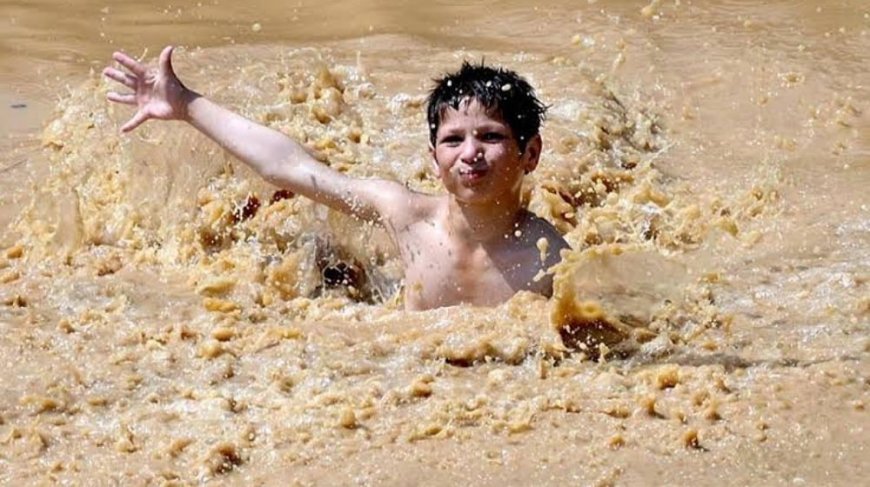Punjab Government Bans Bathing in Rainwater
To protect public safety during severe monsoon flooding, the Punjab government has imposed a complete ban on bathing in rainwater accumulated in streets, low‑lying areas, roads, and open spaces. Further, swimming in dams, rivers, canals, ponds, lakes, and distributaries, and unauthorised boating are also prohibited under Section 144 of the CrPC, effective immediately for 45 days.

To protect public safety during severe monsoon flooding, the Punjab government has imposed a complete ban on bathing in rainwater accumulated in streets, low‑lying areas, roads, and open spaces. Further, swimming in dams, rivers, canals, ponds, lakes, and distributaries, and unauthorised boating are also prohibited under Section 144 of the CrPC, effective immediately for 45 days. This emergency directive comes after torrential rains claimed dozens of lives and sparked widespread flooding across the province.
-
Section 144 was imposed across Punjab, banning all bathing and swimming in rainwater and public water bodies.
-
Areas covered include streets, roads, open spaces, low‑lying zones, rivers, canals, dams, lakes, ponds, and distributaries.
-
Boating restrictions are strictly enforced—only authorised rescue or government personnel are permitted in boats.
-
Duration: 45 days, roughly until late August, barring withdrawal.
-
Safety rationale: Prevent drownings, electrocution, roof collapses, and canal accidents amid surging water levels.
-
Enforcement: Provincial police, PDMA, and Rescue 1122 teams are on high alert.
-
Public awareness: Media advisories, sirens, mosque announcements, and warning signboards in vulnerable zones.
-
Punjab experienced extreme monsoon rains, with cities like Rawalpindi, Lahore, and Jhelum seeing flash flooding and overflowing drains in the past few days. Over 60 deaths and hundreds of injuries were reported in just 24 hours.
-
Rains surged water levels in dams and rivers, heightening the risk of drowning, electrocution, and roof collapses in weak structures.
-
Millions live in low-lying and poorly drained areas where rainwater accumulates rapidly, creating dangerous bathing conditions, especially for children.
-
The ban was imposed under Section 144 of the Code of Criminal Procedure, which empowers authorities to prevent dangers to human life in urgent circumstances.
-
Restrictions include bathing in rainwater, swimming in canals and rivers, and unlicensed boating in any public water body for safety purposes.
-
The Punjab Home Department issued the directive following warnings from PDMA and PMD about escalating flood threats.
Government Action
-
Chief Minister Maryam Nawaz ordered the activation of District Emergency Operations Centers (DEOCs), each operating 24/7 to manage monsoon response.
-
Rescue 1122 and the Pakistan Army have deployed over 800 boats, 15,000 rescue personnel, ambulances, and fire brigades in high-risk districts.
-
Vulnerable structures have been vacated following inspections, and public alerts have been broadcast via mosque announcements and sirens.
Public Awareness Drive
-
The PDMA and local administrations have launched public campaigns via local media, mosques, and signage to warn citizens against bathing or boating in floodwater bodies.
-
Deputy Commissioners have been instructed to install warning signs at high-risk areas and enforce penal action against violators of the ban.
-
Climate change continues to intensify monsoon patterns, with erratic, heavy downpours becoming more common. Short-term bans paint only part of resilience—infrastructure upgrades are critical.
-
Drainage reforms, early warning systems, and flood-resilient urban planning are needed to reduce recurring impacts each monsoon. Recent PDMA directives reference similar lessons.
-
Avoid bursting drains or street pools—never bathe in rainwater or swim in canals, rivers, dams, lakes, and ponds.
-
Children and young adults should avoid playing in newly formed water pools.
-
Follow public announcements and sirens—move to high ground when advised.
-
Keep away from fallen electric wires, submerged manholes, and unstable rooftops.
-
Seek assistance only from authorised emergency services, not informal boats or local crossings.
Punjab’s decision to ban bathing in rainwater and swimming in public water bodies underscores a decisive public safety strategy amidst escalating monsoon floods. While this temporary measure may feel restrictive, the implementation of rescue operations, public alerts, and enforcement signals a clear governmental commitment to reduce drowning and structural accident risks. As monsoon rains persist, the true solution lies in improved drainage, infrastructure resilience, and community awareness, alongside vigilant enforcement of life-saving bans.

 Ateeq Ur Rehman
Ateeq Ur Rehman